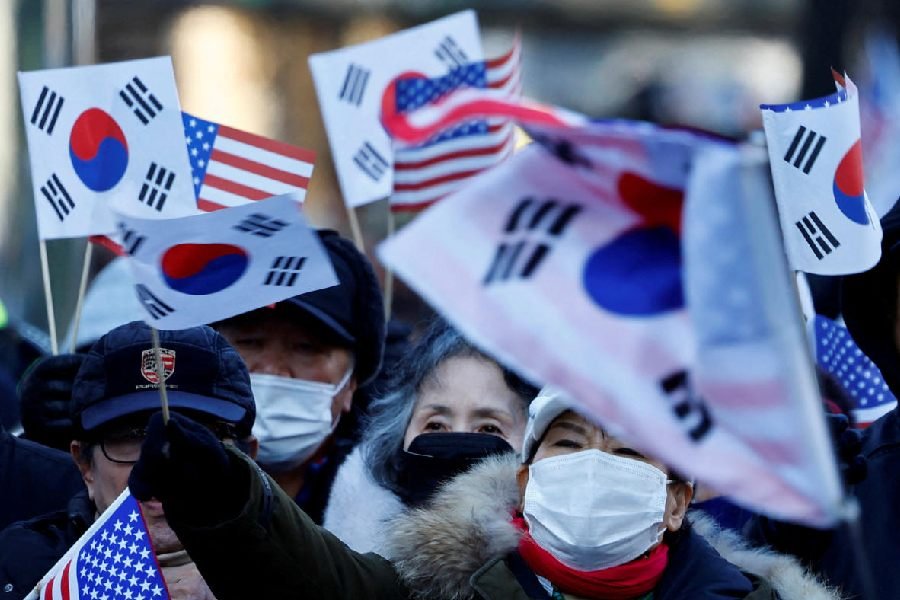
In the current global landscape, increasingly defined by uncertainty and rising geopolitical tensions, the series of events unfolding in South Korea offers a sobering reminder of the fragility of democratic frameworks, even in countries celebrated for their democratic principles. The latest imposition and then swift revocation of the emergency martial law by the South Korean President have not only plunged the country into political turmoil but also cast a spotlight on the challenges facing democracies everywhere. For India, this chain of events provides a critical opportunity for introspection on the resilience of her democratic institutions, the hypocrisies in Western-controlled narratives about democracy, and the role she must play on the world stage.
Dance of Democracy
South Korea, an Asian economic giant, long lauded as a “full democracy” by indices that rank nations on subjective scales, has suddenly found itself grappling with a crisis that threatens its political foundations. The midnight declaration of emergency martial law, followed by televised images of troops attempting to breach the Parliament, marked a complete U-turn from the principles of transparency and the rule of law. Although the emergency measures were swiftly overturned by the National Assembly, the unfortunate event left a string of serious questions about the health of South Korea’s democracy.
For India, often labeled a “flawed democracy” in the same indices, the event underscores the inconsistencies and biases in these global assessments. Despite challenges like caste dynamics, bewildering regional diversity, and an ever-evolving political landscape, India’s democratic framework stands unparalleled. It thrives amidst a level of diversity that no other country manages to accommodate, let alone celebrate.
Unlike South Korea, whose political struggles today reflect deep systemic vulnerabilities, India has weathered its historic challenges, including the 1975- Emergency, and emerged stronger. Ever since then, India remains a robust democracy where every voice, however contentious, finds a platform. In modern day, India remains the world’s largest and probably Asia’s only real democracy, in a region filled with complete political unrest and authoritarian regimes.
Western Hypocrisy
The unfolding events in South Korea expose Western hypocrisy in selectively scrutinising democracies based on strategic interests. Countries like South Korea, staunchly backed by the West, are often portrayed as epitomes of democratic governance, even as some of their actions belie these assessments. Meanwhile, India, with its very own model of participatory governance, faces disproportionate criticism.
India’s democracy is truly a rare phenomenon, a mechanism that allows 1.4 billion plus people from different religions, languages, and cultures to coexist and participate in collective decision-making. This kind of diversity is not a liability but a strength, showcasing the potential of democracy to foster coexistence amidst differences. Nevertheless, the global discourse often overlooks this resilience, favoring metrics that align with Western democratic models while ignoring the complexities and challenges faced by non-Western democracies.
Lessons for India
India’s democracy, deeply rooted in its robust Constitution, has steadily nullified external influences, safeguarding its sovereign decision-making. Lessons learned early in its democratic journey have driven India to strengthen its institutions, ensuring resilience against internal and external challenges. Over the last few decades, India has demonstrated remarkable stability, bolstered by judicial independence, press freedom, and public trust in good governance. India’s commitment to strategic autonomy and non-alignment has allowed the nation to navigate regional issues without compromising democratic values. By reinforcing transparency, institutional integrity, and the distinction between civilian governance and military roles, India has emerged as a model of stable democracy, thriving as a bright spot in an increasingly unpredictable geopolitical scenario.
India’s Global Role
The existing global geopolitical landscape is fraught with crises such as the Russia-Ukraine and West Asian wars, the political crisis in Bangladesh, rising tension in Syria, and now, the South Korean democratic crisis. These events are not isolated but interconnected, often fueled by rivalries among major world powers. For India, this presents both a challenge as well as an opportunity. As a nation with a stable foundation, India can serve as a Dialogue & Diplomacy Driver in an increasingly polarized world. India’s position on key issues, appealing for dialogue and diplomacy, reflects her prospect to act as a voice of reason. Additionally, India’s growing economic, infrastructural, and technological superiority positions her as a central player in shaping a multipolar world order.
Why Democracy Is India’s Greatest Strength
At its central pillar, democracy is all about inclusion and hope. It ensures that every citizen of this country, regardless of his or her background, has a voice in nation- building. This inclusivity has allowed for peaceful coexistence amidst profound diversity, enabling the country to address social injustices, prosecuting the corrupt, and engaging in debates that, though often contentious, strengthen the democratic fabric.
In contrast, countries like South Korea, despite their high governance standards, remain quite vulnerable to crises stemming from entrenched inequalities and external influences. The South Korean crisis is also a stark reminder of what is at stake when a democratic framework and its principles are compromised. The lesson for India is crystal clear, democracy must be nurtured not just as a political governance system but as an evolving way of life.
As the world community grapples with uncertainty and upheaval, India must reject the deeply flawed narratives that undermine her democratic achievements. Instead, she should double down on her commitment to inclusivity, sovereignty and strategic autonomy. In doing so, India not only secures her future but also stands as a beacon of hope and resilience for democracies worldwide.






Add comment